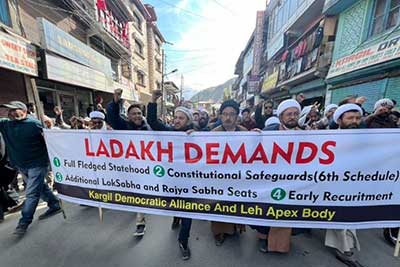Date: 04/02/2023
Relevance: GS-2: Indian Constitution- historical underpinnings, evolution, features, amendments, significant provisions, and basic structure.
Key Phrases: Sixth Schedule of Indian constitution, Article 244 of the Constitution, Leh Apex Body (LAB), Kargil Democratic Alliance (KDA), Restoration of full-fledged Statehood, Job reservation for locals, Autonomous District Councils.
Why in News?
- An agitation demanding the inclusion of the Ladakh region in the Sixth Schedule under Article 244 of the Constitution (special protection to tribal populations) boiled after Sonam Wangchuk, a Magsaysay winner, went on a fast.
What does Ladakh Demand?
- Leh’s political and religious bodies formed the Leh Apex Body (LAB) in 2020. In the Kargil district, political parties, including the National Conference and the Congress, and Shia Muslim-affiliated seminaries joined hands in November 2020 to form the Kargil Democratic Alliance (KDA).
- Despite the differences in their political stands, LAB and the KDA are now together over common goals.
- They have put forth four major demands before the Centre, which include:
- Restoration of full-fledged Statehood,
- Constitutional safeguards under the Sixth Schedule,
- Separate Lok Sabha seats for Leh and Kargil districts, and
- Job reservation for locals.
- They describe the demands as key to protecting Ladakh’s identity, culture, and fragile environment.
What is the Sixth Schedule?
- The Sixth Schedule under Article 244 of the Indian Constitution provides for the formation of autonomous administrative regions called Autonomous District Councils (ADCs). These have some autonomy on legislative, judicial, and administrative matters within a state.
- ADCs have up to 30 members with a term of five years, and can make laws, rules, and regulations with regard to land, forest, water, agriculture, village councils, health, sanitation, village- and town-level policing, etc.
- The Bodoland Territorial Council in Assam is an exception with more than 40 members and the right to make laws on 39 issues.
- Currently, it applies to the North-eastern states of Assam, Meghalaya, Mizoram (three Councils each), and Tripura (one Council).
Why does Ladakh want to be part of the Sixth Schedule?
- There was much enthusiasm initially, mostly in Leh, after the August 5, 2019 decisions that created two new Union Territories.
- Buddhist-dominated Leh district had long demanded UT status because it felt neglected by the erstwhile state government, which was dominated by politicians from Kashmir and Jammu.
- The enthusiasm waned as it was understood that while the UT of J&K would have a legislature, the UT of Ladakh would not.
- There had been four MLAs from the region in the erstwhile J&K Assembly; the administration of the region is now completely in the hands of bureaucrats.
- To many in Ladakh, the government now looks even more distant than Srinagar. Also, the changed domicile policy in Jammu and Kashmir has raised fears in the region about its own land, employment, demography, and cultural identity.
- The UT has two Hill councils in Leh and Kargil, but neither is under the Sixth Schedule.
- Their powers are limited to the collection of some local taxes such as parking fees and allotment and use of land vested by the Centre.
Can Ladakh be included in Sixth Schedule?
- In September 2019, the National Commission for Scheduled Tribes recommended the inclusion of Ladakh under the Sixth Schedule, noting that the new UT was predominantly tribal (more than 97%), people from other parts of the country had been restricted from purchasing or acquiring land there, and its distinct cultural heritage needed preservation.
- Notably, no region outside the Northeast has been included in the Sixth Schedule.
- Even in Manipur, which has predominantly tribal populations in some places, the autonomous councils are not included in the Sixth Schedule.
- Nagaland and Arunachal Pradesh, which are totally tribal, are also not in the Sixth Schedule.
- Ladakh’s inclusion in the Sixth Schedule would be difficult. The Constitution is very clear, Sixth Schedule is for the Northeast. For tribal areas in the rest of the country, there is the Fifth Schedule.
- However, it remains the prerogative of the government — it can, if it so decides, bring a Bill to amend the Constitution for this purpose.
Government’s response:
- The Centre appears to be in a bind as the two committees it appointed to reassure the local populations have made little headway in the last two years.
- The second committee appointed this year under Minister of State for Home Nityanand Rai has only deepened local anger, as it has no mandate to address the issues being raised.
Conclusion:
- In the absence of drastic measures to assuage the locals by meeting their genuine demands, the region will only remain embroiled to the advantage of that intent on fomenting trouble.
- The government should form an all-inclusive committee with the inclusion of all the stakeholders to discuss measures to protect Ladakh’s “unique culture and language”, considering its geographical location and strategic importance.
- Elaborate discussions should take place so that the demands can be fulfilled with proper evaluation and actions can be taken according to the needful.
Source: The Hindu
Mains Question:
Q. What is the Sixth Schedule of the Indian constitution, and why Ladakh is demanding to be included under it? Discuss.






















